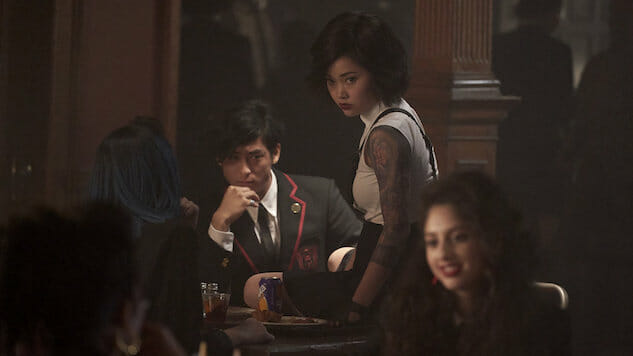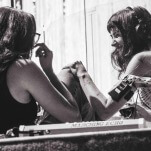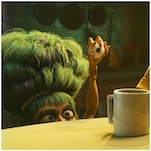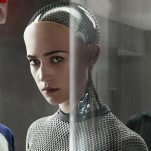How Syfy’s Deadly Class and YouTube’s Wayne Update John Hughes for Our Mad-As-Hell Moment
Photos: Allen Fraser/Syfy; YouTube Premium
“I am not going to sit on my ass as the events that affect me unfold to determine the course of my life. I’m going to take a stand. I’m going to defend it. Right or wrong, I’m going to defend it.” —Cameron (Alan Ruck), Ferris Bueller’s Day Off (1986)
2019 is still young, but there’s already something Hughesian in the air. John Hughes, that is. Thus far in January, the Breakfast Club-y grown-ish returned to Freeform for its sophomore season, and Sex Education, which has been called a “contemporary British love letter to American high school films,” premiered on Netflix. This week, two more Hughes-infused series—Syfy’s Deadly Class and YouTube Premium’s Wayne—join the fold.
With its teen boy hero, Wayne McCullough (Mark McKenna), whisking his girlfriend, Del (Ciara Bravo), away on a road trip to retrieve his dad’s beloved sports car—and his put-upon principal (Mike O’Malley) and best friend (Joshua J. Williams) giving chase behind them—Wayne is basically one John Wick-ian sidestep away from being Ferris Bueller’s Day Off. Wayne and Del even follow Alan Ruck’s Cameron into fully-clothed, angst-propelled leaps into a swimming pool.
Where Wayne is Ferris Bueller armed with brass knuckles, the 1980s-set Deadly Class, with its mötley crüe of teenage psychopaths, punks and bruisers who populate an underground boarding school of assassins, is the most bloodily extreme iteration of The Breakfast Club one could imagine. Yes, this includes the obligatory cross-clique bonding weekend detention, featuring homeless teen Marcus Lopez (Benjamin Wadsworth) and half of the core cast. More granularly, it also includes a goth outsider chick (Taylor Hickson) with heavily kohled eyes pairing up with the most muscley blond “sporto” on campus (Sean Depner); a secondary protagonist (Luke Tennie) for whom deviating from his rigid and specific reputation would basically be suicide; and one of the school’s resident punks (Psych’s Liam James, almost unrecognizable in a slime-green mohawk) descending into a terrifying, Bender-esque fever-rant about his abusive father. Really, there are a lot of a abusive fathers in Deadly Class—like, upsettingly many. Considering the secrets uncovered by the big group soul-search Hughes staged on the floor of that iconic two-story library, though, in this way, too, Deadly Class is The Breakfast Club in bloodier clothes.
Given that Hughes died 10 years ago this August, you might be tempted to chalk the mini-boom up to a kind of epitaphic nostalgia: We, the beating heart of 2019’s creative class, are the John Hughes generation, and we are here to delight in the rose-tinted memories of our adolescence. When you really absorb the brutality with which Wayne and Deadly Class interpret Hughes’ most familiar beats, however — see the series’ first, more pummeling trailers here and here — you might arrive at a different explanation: That a significant contingent of the Hughes generation, a cohortt that came of age in the era of the dot com bubble, the Great Recession, and the shattering of American democratic values, are brimming with the pent-up, electrifying, consequences-be-damned rage against injustice that is generally most potent in adolescence—and they (who am I kidding: we) are done holding it in.
We want, that is to say, the catharsis of seeing fictional teens blow shit up.
Ferris Bueller may have been a give me liberty or give me death renegade, Cameron Frye may have lived in a constant state of near-suicidal depression, and John Bender may have been a knife-toting bad boy, but as far as models of “blowing shit up” go, Ferris Bueller’s Day Off and The Breakfast Club aren’t the most robust. Still, the seeds for violent teen revolt are there: As A.O. Scott wrote upon Hughes’ death in 2009, the director’s mid-1980s teen films, each more fable than documentary, “capture—with a winning mixture of optimism and melancholy, with a generosity of spirit tempered by a punitive sense of right and wrong—something essential in the experience of youth.” (Emphasis mine.)
In this sense, Wayne and Deadly Class mining the earnestly clean plots and character beats of Hughes’ most iconic work for a narrative that fits their impulse to “blow shit up” is not as awkward in practice as it might seem on paper. In turning their teen protagonists into such gleefully no-fucks-given beatdown machines, Wayne and Deadly Class each make sense of some of the most visceral “life is bullshit” threads that Hughes’ films teased but never satisfactorily tied up: Sometimes, as Deadly Class illustrates so graphically that it has to resort to comic book animation not to spook standards and practices, parents are so terrible that all you can do is escape with your life. Sometimes, as Wayne illustrates every time it pans through Wayne’s free-for-all corridors, schools are so underfunded and poorly managed that the greatest thing most students will learn is how to fend for themselves. Sometimes, as both series illustrate with equal grimness, crazy people get dangerous weapons. Sometimes good people get sick from their work and die sooner than they should because they can’t afford not to. Sometimes the only adults you have to turn to would rather meet you in the parking lot for a fight than help you solve your problems. Sometimes the system doesn’t just give you the middle finger, it burns your whole life up. Sometimes, when that happens, the only thing you can do is shake out your shoulders and fight back. As in:
Petra (Deadly Class): “These animals see kindness as weakness. Safer to be a dick.”
Marcus (Deadly Class): “It’s a cold, cruel world. You can’t survive without a family, even if they are liars and murderers.”
Principal Cole (Wayne): “There’s always going to be people doing rotten stuff. But you gotta let the proper people handle it. If you run around righting wrongs all your life, that’ll be your life.”
Wayne (Wayne): [Whips a bully’s head back with a trumpet; locks an abusive boyfriend to a pole with U-lock; hauls an asshole who’s about to drop undocumented workers off at ICE instead of paying them for their labor out of his van and nailguns his hands to the side of it.]
Do not be mistaken: Wayne and Deadly Class, though more honestly reflective of some of the bleakest parts of contemporary American society than Hughes’ fuzzy, comedic abstractions, are as much highly stylized fables as the films they echo, just in a viciously opposite direction. Still, in turning the fable-telling that direction, they center real problems that are absolutely worth blowing up. Classism existed in Hughes’ films, sure, but never with enough depth to ask the audience to grapple with the hardness of living in financial and social poverty, let alone realize how important blowing that shit up (in real-world terms, fixing it) could be. Sexism and racism both existed in Hughes’ films, but more as comedic feature than outrage-inducing bug. In Wayne and Deadly Class, sexism becomes the productive fulcrum of half the action, while the built-in diversity of the King’s Dominion school foments caste and racial tension that let Deadly Class live up to its name. (With the Florida-set back half of Wayne not made available for review, time will tell how racism is dealt with there.)
That said, cathartic or not, seeing the hard-living teens at the heart of these series blowing up so many of the real, systemic problems facing today’s America doesn’t actually solve any of those problems. Neither does the fact that, thanks to the shows’ creative teams using the classic shots and romantic stings the Hughes generation has learned by heart, we can see those problems with greater clarity. But neither catharsis nor clarity hurt—especially when, as Wayne demonstrates a dozen times each episode, some of Hughes’ inherent “optimism… and generosity” of spirit survived the trip to 2019 intact:
Allison Reynolds (Ally Sheedy, The Breakfast Club): When you grow up, your heart dies.
John Bender (Judd Nelson): So, who cares?
Allison: I care.
Del (Ciara Bravo, Wayne): [Delivering a speech while running for class president, in front of a student body that mocks her for being a “crack baby”] You don’t have to like me, but I like you, and I want to do good.
With so many wild differences between these shows and grown-ish and Sex Education, I hope the Hughesian moment we seem to be in continues and deepens. Still if this is where the moment ends, at least it’s landing with a boom.
Wayne is now streaming on YouTube Premium. Deadly Class premieres tonight at 10 p.m. on Syfy.
Alexis Gunderson is a TV critic and audiobibliophile. She can be found @AlexisKG.







































